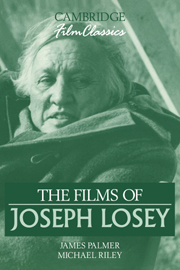Book contents
- Frontmatter
- Contents
- Acknowledgments
- 1 “Pictures of Provocation”
- 2 “What Beauty Is There, What Anguish”: King and Country
- 3 “An Extension of Reality”: The Servant
- 4 “The Inner Violence”: Accident
- 5 “The Annihilation of Time”: The Go-Between
- 6 “The Arrival of Strangers”: The Romantic Englishwoman
- 7 “No Ready-Made Answers”
- Notes
- Filmography
- Works Cited
- Index
7 - “No Ready-Made Answers”
Published online by Cambridge University Press: 16 January 2010
- Frontmatter
- Contents
- Acknowledgments
- 1 “Pictures of Provocation”
- 2 “What Beauty Is There, What Anguish”: King and Country
- 3 “An Extension of Reality”: The Servant
- 4 “The Inner Violence”: Accident
- 5 “The Annihilation of Time”: The Go-Between
- 6 “The Arrival of Strangers”: The Romantic Englishwoman
- 7 “No Ready-Made Answers”
- Notes
- Filmography
- Works Cited
- Index
Summary
A baroque stylist, a formalist filmmaker more involved in exploring elaborate settings or experimenting with cinematic time than in caring about his characters; a pessimistic allegorist who paints, then damns, the darkness; or a humanist, generous and compassionate, attuned to the injustice of racial and class prejudice, and an enemy of hypocrites and opportunists – such labeling, a makeup of truths and half-truths, of distortions, misconceptions, and some insight as well, obscures a full and thoughtful view of Joseph Losey, who abhored labeling of any kind. Beginning as a director of films posing answers to social problems, he became a director compelled by emotional and moral dilemmas lacking ready answers. Cautious about making “heroes where there are no heroes and villains where there are no villains,” Losey said that “I incline, and always have, to the thought that it's pretty hard to find absolute good and absolute evil in any one person. But of the existence of good and evil I have no doubt” (Gow 1971, 37).
A controversial and uncompromising artist, Losey was aware that his films placed certain demands on the viewer. “I don't want to do anyone's thinking for them,” he said.
Instead, I wish to give people the benefit of my particular observations, of my particular eye, my particular view of things, and also of such passion as I feel about various things. Sometimes my view is highly passionate, and sometimes it's highly destructive rather than constructive, but I have no ready-made statements, no ready-made answers, no easy emotional identifications.
(1970, 59)- Type
- Chapter
- Information
- The Films of Joseph Losey , pp. 145 - 147Publisher: Cambridge University PressPrint publication year: 1993



